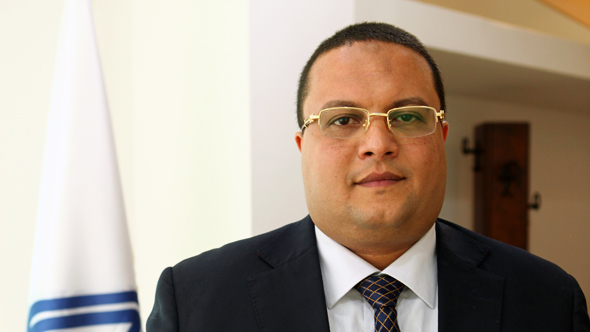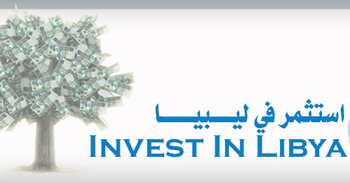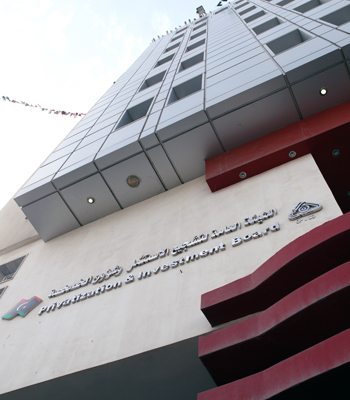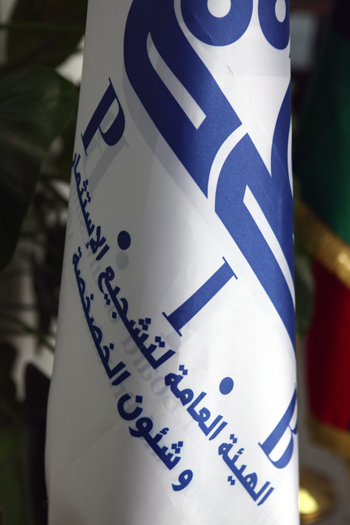Investment in Libya: “The FDI from 2002 until 2010 was Near to US$ 6 billion,” says PIB
Eng. G.I. Guider, Chairman of the Privatization and Investment Board
The FDI from 2002 until 2010 was near to US$ 6 billion. Investment law no 9 (issued in 2010) is a good law, we have amended certain parts of the law to improve it.
Interview with Eng. G.I. Guider, Chairman of the Privatization and Investment Board

In 2002 and 2011, well let’s say since 2003 and throughout the regime Libya came back into the limelight and there was a process of engagement with the international community, there had been a lot of investment plans but then the revolution happened. Where are we standing at the moment? What is the new plan for investment in Libya?
The
FDI
from 2002 until 2010 was near to US$ 6 billion. I think a lot of investors couldn’t trust the government in this country before. In my opinion this is the main thing that has changed.
Firstly I would like to thank you for this opportunity. I would like to give some information about our Board, the PIB; it is our responsibility to work under investment law N0 9, to look after foreign and local investors and to give them permission to provide a service. Also we are responsible for privatization, the transference of state owned companies to the private sector.
I would like to say that in Gaddafi’s time the country was working without an investment master plan, there was no master plan for the whole country. Even in terms of investment we couldn’t say that there were real opportunities, you couldn’t find the land, there were barely opportunities in tourism, industry, oil etc. However, now we are starting to make improvements in all the Ministries and all the local authorities. We are starting to bring together all the data here at the Privatization and Investment Board and into our master plan, in order to provide all this data to potential foreign investors who need to have all the information necessary to decide if they will invest in Libya or not.
Investment law no 9 is a good law, issued in 2010, we have changed some parts of the law to improve it. We are able to offer lots of benefits to investors such as: no taxes for 5 years, no stamp duty, no export or import tax, international insurance, all foreign investors can open a bank account in any of the 3 banks in Libya; they can transfer their profits through our Board etc. We have also now established a free investment one stop shop in Tripoli, Misrata and another in Benghazi. These one stop shops were set up in January 2013. 
They offer many services, such as immigration services all from one place. We are looking to finish our draft investment law by the end of this year, and we are looking to establish more of these one stop shops in cities all over Libya, we also hope to complete our investment master plan by the end of the year. We hope to gather information about many large cities in Libya such as Sabha, Tripoli, Misrata, Derna, Benghazi and Zahwiya and later on we will gather information about the villages and small towns. If we can do this by the end of the year then we will be very happy.
What is your expectation for the level of FDI for this year and the following? What are you aiming for?
There are a lot of negotiations from Turkish investors and from the Arab Gulf countries and also from some countries in Europe such as Italy and the UK. There are Turkish investors already here in Tripoli doing business and another Turkish investor in Benghazi. After the revolution we have to make sure we are stable and safe, I think everything is going well and that by the end of this year safety will have improved a lot in comparison to during Gaddafi’s time.
So what are your targets for FDI?
The FDI from 2002 until 2010 was near to US$ 6 billion. I think a lot of investors couldn’t trust the government in this country before. In my opinion this is the main thing that has changed. This government and the next will be democratic; it will not be like Gaddafi’s government. This situation will encourage people to invest in Libya; this is my opinion. If we save this country and give the investors the real information to help them invest in Libya, they will come. Especially as we have plentiful resources here for example we have oil to start a petrochemical industry. The Ministry of Industry is going to begin making a road map for the petrochemical industry, the Ministry of Tourism is renewing their master plan for investment and all these committees will join together. The Ministry of Industry does an excellent job, the Ministry of Power and Renewable Energy is putting together a new master plan for investment in this field. All these master plans should be finished by the end of the year so that we can put it all together in our overall Investment Board master plan, and then we can give the investors all the information about the opportunities, the security situation etc. to give them some assurance about their investments. 
What are your projections for the next ten years?
Before we have our master plan, we cannot say exactly what our projections are.
How much FDI does Libya get?
A lot. As you know Libya has 6 million people, this is a wealthy country. We are looking for FDI but also for a lot of information and technology to improve our local private sector. The local private sector is very small, we would like to work with them through certain programs like PBB or private equity for example to improve the local private sector through FDI.
This brings me to the next question: what is the roadmap to privatization?
There was no such thing as privatization in Gaddafi’s time; there was something like’ ownership transfer of the factories to the labour without money’; a different philosophy. Now we have changed all of the law regarding privatization, we want a new law and I believe that in a month’s time we will finish the draft privatization law. We will pass it on to the Prime Minister and after that they may pass it on to Congress to issue it. In my opinion I prefer PBB or BOT to privatization, because currently we have some issues with the old owners of the factories because Gaddafi took the factories from whoever owned them privately before and so I think we would prefer to work in the first few years with BOT with foreign investors rather than selling these factories. This is my opinion but we will have to wait and see what the team who is responsible for this says about this. We will then be able to make a model from their results. I personally prefer the BOT model that they have in Turkey I believe.
What are the most lucrative investment opportunities that Libya has to offer? How much would they generate?
In my opinion the petrochemical industry is a very important one as well as transportation and shipment, as we are able to implement a lot of infrastructure in those sectors particularly. There are many SMEs in various sectors in Libya and it is very important to focus on improving them. In my opinion renewable energy, transportation and the petrochemical sectors offer excellent opportunities right now. The tourism sector has potential but I believe that if we start with investment in the petrochemical industry, transport and renewable energy that would be best. 
What kind of returns from these investments would be likely? It is true that there is risk but also there is a lot of money to be made…
Yes, I think that when investors feel that they can get true information coming from this country and that their money and business venture will be safe, I think that they will come. Here you are in the middle of North Africa, with 2000km2 of land and sea side. I think our market is Europe, we can transfer a lot of goods from Europe to Africa and vice versa, by aeroplane, ship, trains etc. you can do it in this country. We need a plan and a vision. In Gaddafi’s time we didn’t have a vision or a master plan. There has been no long term vision in this country since 1981. In Gaddafi’s time they worked case by case, in the last 25 years every problem was worked on individually with no overall vision. If this country takes on a vision and has a 20 year approved plan with a master plan for all sectors we will be able to create our investment master plan. This will be a real opportunity. It will allow us to give advice to investors. At the moment we can say that by the end of the year we will be able to offer real information from the ground so that investors can suggest ideas that we can negotiate at the Board and with the Ministers in order to approve their opinion or project for example. This is my opinion; our problem in this country is planning and management.
When you travel abroad and you meet investors and people interested in coming to Libya, what would you say is your major challenge in convincing them to come here?
The major challenge is that a lot of investors think that Libya is a country like Tunisia and Egypt for example. Ok, we had a revolution but it is finished and we have to move on. The reality is that this country was not a country before the revolution; it was something like a company. A country has a long term vision, a master plan, it has local authorities etc. but we didn’t have that before, we have to build up from zero. We explain this a lot to foreign investors and some understand the real situation in this country, particularly the Turkish investors. They understand our intentions as a country. I think this government and parliament is doing well after just 15 months to have a master plan and a new vision, and to have started with some roadmaps in oil, tourism, renewable energy etc. this is what we have to do and it is what we are doing.